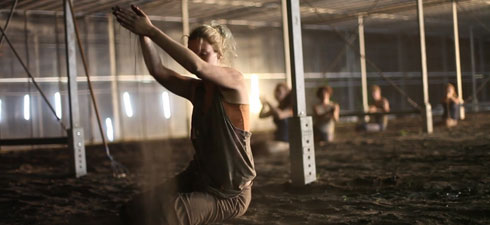“We want to give a face to labour migrants from Eastern Europe”, says writer and theatre makerPeter Dictus on a Saturday in a huge empty greenhouse in Zundert. “They are normal people that have settled here in large numbers, but the rest of the town would rather ignore them. They are only seen as cheap labour.”
Saturday afternoon, rehearsals are in full swing for theatre production Moeland - Rijk van de Armen [Moeland - Kingdom of the Poor], which will be put on in the greenhouse over the coming three weekends. Members of Het Zunderts Toneel crawl over the black sandy soil like strawberry pickers.
Monologues are practised elsewhere in the greenhouse. “I trade, I purchase, I sell, I rent out”, says one of the actors. He plays the slumlord who makes big money on the renting out of rundown homes or caravans to East Europeans for usurious prices. “I contribute to society. I’m not a bad guy.”
Total lack of interaction
Text writer Dictus, a resident of Zundert, hopes that employers in the greenhouse sector will come to the “documentary theatre”. He also hopes they will have a different perspective on the phenomenon of labour migration. It is not only about economics, it is also a social story, about the total lack of interaction, let alone integration.
According to figures from the Dutch Central Bureau of Statistics, Zundert is the most densely populated area of the Netherlands when it comes to labour migrants from Central and Eastern Europe. According to the municipality, some 2,500 people from that region live here. That is almost 12 percent of the local population. Other estimates run to 4,000 persons.
“We cannot ignore this, literally and figuratively”, says Dictus. “We know they are there, but we don’t want to see them. They are desperately needed on the strawberry fields or in the tree nurseries, but as human beings we want to keep them hidden.”
“They are only seen as a pair of hands here”
Journalist and photographer Riet Pijnappels, also from Zundert, photographed various migrants at their work and at home. The photo exhibition, which will be on show from next weekend in the chapel of the former Sint Annaklooster, literally gives a face to Polish asparagus pickers and Lithuanian strawberry pickers. “But they are only seen as a pair of hands here in the village,” Pijnappels says.
Most Eastern Europeans live in holiday parks in Zundert. The Fort Oranje camping site is filled with dozens of rickety caravans filled with Poles, Romanians and Lithuanians. “And they have to pay 500 euros a month for the ‘privilege”, scoffs Pijnappels. “Pure exploitation. That is another side of the migration story.”
Dictus is surprised about how the different populations can be so physically close and yet live such totally separate lives. Last weekend Zundert held its famous parade of flower floats. In the framework of the “Central and Eastern Europe” project, a few weeks ago the Zundert Stage Group and some seventy Eastern Europeans cycled past a number of tents where the floats were being built. “The Zundert residents and the people from Central and Eastern Europe initially stood gaping at each other like rabbits caught in the headlights of a car.”
“Lives on hold”
He acknowledges that the Eastern Europeans share some of the blame, they are often not interested in integration. “I know a group of Romanians who have been working for the same grower for twelve years, ten months a year. Yet they still call themselves seasonal workers. This makes me think of the Moroccans who came to live here fifty years, to work temporarily in the jam factory. They still live here, in what we call the problem district of Zundert.”
In the play he also shows the “postponed lives” of the Eastern Europeans. “They left home, but never arrived anywhere. They live in a kind of no man’s land. Their lives are on hold, in some cases for ten years or longer. They dream, work and save.”
Was this article useful? If so we are delighted!
It is freely available because we believe that the right to free and independent information is essential for democracy. But this right is not guaranteed forever, and independence comes at a cost. We need your support in order to continue publishing independent, multilingual news for all Europeans.
Discover our subscription offers and their exclusive benefits and become a member of our community now!












